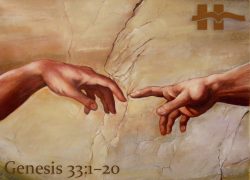aBeLOG
Welcome to the aBeLOG, a series of (hopefully!) fortnightly posts on all matters homiletical. I intend to touch on whatever grabs my attention regarding preaching—issues contemporary and ancient, ideas hermeneutical and rhetorical, personalities conservative and liberal, publications antiquarian and avant-garde. Essentially, I’m going to follow my own homiletical olfactory instincts up rabbit trails and after red herrings. Comments are always invited and appreciated.
Michael Easley: How I Preach
Michael Easley: And this is How I Preach …
[Michael Easley is the Teaching Pastor at Fellowship Church in Nashville, TN, and the host of Michael Easley InContext, a weekly radio program. He is the erstwhile President of Moody Bible Institute. And his pastoral experience spans more than three decades. A DTS grad, Michael is a preacher at heart and pastoring runs in his veins. I had
Genesis 38:1−30
Agents of God’s blessing are selflessly concerned about others and humbly aware of their own fallibility.
In Genesis 34, Simeon and Levi, because of their impetuosity and bloodthirstiness had disqualified themselves from leadership; in Genesis 35, Reuben—the mandrakes and incest guy—also had been disentitled. The next in line was Judah. And in Gen 37, it appeared that Judah’s brothers had begun to follow his lead over Reuben’s. It appears that in Gen 38 Judah
Genesis 37:1−36
Agents of God’s blessing to others can expect misunderstanding and mistreatment from them.
The pericope begins with Joseph bringing to his father an “evil report” regarding his siblings (37:2). While the use of dibbah elsewhere indicates “slander” or “evil report” that may not be necessarily true (Num 13:32; Ps 31:4), in light of Prov 25:10 that employs the word to indicate a true (but disparaging) report, there is no reason to think that the dibbah
Genesis 35:1−36:43
The blessings of God fulfilled in the past, promotes worship of God that, in turn, continues the cycle of divine blessings for the future.
This section forms the formal conclusion to the Jacob Story that began in Genesis 25. Here, we see a collection of scattered accounts (Genesis 35) along with a closing genealogy (Genesis 36).
The structure of Genesis 35 is a travelogue of Jacob and his camp from Shechem to Hebron, a severance of the marked by four burials—three actual
Genesis 34:1−31
Enjoying God’s blessings calls for responsible maintenance of moral standards in the face of worldly evil.
This is a sordid story, with no heroes. Everyone is culpable (except the victims: Dinah, sexually violated and voiceless, and the people of Shechem, brutally slaughtered or kidnapped).
Shechem, the son of Hamor, the Hivite, rapes Dinah, the daughter of Jacob (34:2). But, he seems to show some good faith as he and his father enter into negotiations with Jacob
Genesis 33:1−20
Faith in God is marked by seeking and extending forgiveness, thus restoring relationships with others, and also with God.
The previous pericope depicted Jacob finally receiving God’s blessing. That would have been a blissful ending to the turbulent story of the patriarch. However, one more thing needed to be accomplished: reconciliation with Esau.
And so, as younger brother comes before his older sibling, Jacob prostrates himself seven times (33:3)—a mark of great respect
Genesis 32:1−32
Remembering that God fights for him/her, the child of God lives life with confidence and fearlessness.
Jacob’s encounter with the angels of God and the “camp of God” (Gen 32:1–2) reminds him (and the readers) of the continued presence of God and the protection of God, as he moves with his caravan closer to a rendezvous with Esau, who, when we last heard of him, had been harboring homicidal inclinations towards his heel-grabbing younger brother (27:41). Jacob, no



















 Abe Kuruvilla is the Carl E. Bates Professor of Christian Preaching at The Southern Baptist Theological Seminary (Louisville, KY), and a dermatologist in private practice. His passion is to explore, explain, and exemplify preaching.
Abe Kuruvilla is the Carl E. Bates Professor of Christian Preaching at The Southern Baptist Theological Seminary (Louisville, KY), and a dermatologist in private practice. His passion is to explore, explain, and exemplify preaching.